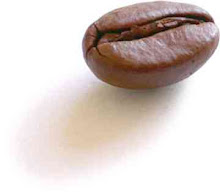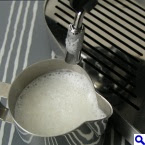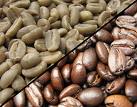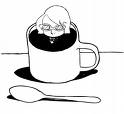The cupping process was conceived as a means for evaluating and comparing different coffees on a level playing field. Because the differences between great coffees can be very delicate, observations about the characteristics of those coffees (flavor, body, finish…) can be easily influenced by small variations that occur as part of most brewing methods. By eliminating some of these variables, a carefully prepared cupping allows the coffees being tasted to compete on the basis of their own intrinsic merits.
Some degree of scientific rigor is key to conducting a fair cupping. Measurements of water and coffee grounds should be precise, any grinding equipment should be flushed between cups to prevent cross-contamination, and the pouring of hot water should be done with great consistency. Time is also a factor; once the grounds are wet the steeping process is underway, and the coffee will undergo many changes in chemistry and flavor over the next 20 minutes.
It is very important to evaluate each coffee from the start of this cycle to the finish, so most cuppers have developed a protocol for managing this sequence of events to ensure that every coffee on the table gets equal treatment.
For casual cupping at home the protocols need not be so rigid, as the stakes are quite different. Cupping coffee at home can open you up to a whole new world of what makes coffee the special thing it is to many of us. You’ll discover flavors and nuances you never thought existed in a cuppa joe. You’ll learn to evaluate and categorize coffees that would do well in your own custom blends, if you’re a home roaster, or even if you’re buying a variety of single origin beans, and post blending them at home.
Cupping is also very much a social thing. While one can cup alone, cupping is best done in a group, where you can compare and contrast notes, opinions and thoughts on what you are sampling. For many beginning cuppers, evaluating coffee with others will open your eyes and your tastebuds to nuances in a coffee you might have otherwise missed - your cupping partners will point something out and you will revisit the sample and possibly discover it yourself.
A site for coffee nerdom, espresso foolery and what's happening in the cuppa. We hope to inform, educate, humiliate and offend most everyone that enjoys a good, honest and not so honest cup of coffee every morning, lunch and dinner
Email the Coffee Nerds at covertcoffee@gmail.com
Saturday, May 19, 2007
Cupping for Beginners - Why People Cup Coffee
Friday, May 18, 2007
Tuesday, May 15, 2007
BREAKING IT DOWN-COFFEE'S SIX ESSENTIALS
1-Correct coffee to water ratio. The finished brew is a balance between strength (solubles concentration) and extraction (solubles yield). Shifting the balance either way greatly affects the final product.
2-A coffee grind that matches the brewing time. Once you've established a coffee brewing formula, the method of brewing and the operation of the equipment come into play. To prevent under-development or over-extraction of the flavoring compounds, you must match the correct particle size (grind) of the coffee to the brewing method and type of equipment used. As a general rule, longer brewing times should be paired with larger (coarser) particles, and shorter brewing times should be paired with smaller (finer) particles.
3-Proper operation of brewing equipment. Brewing equipment normally controls three variables.
*Time of contact between the coffee grounds and water
*Temperature of the water. Water that ranges in temperature between 195F and 205F liberates aromatic materials more rapidly and permits proper extraction
*Turbulence.
4-Optimum brewing method. using the same type of coffee in different brewing equipment will create coffee beverages with different taste and body characteristics.
5-Good water quality. When preparing a coffee beverage, water is just as important as the coffee. In fact, water represents more than 98% of the beverage.
6-An appropriate filtering medium. Unless something separates the extract from the coffee grounds, the resulting beverage will be murky and difficult to drink.
Ultimately, the coffee beverage's quality depends on your ability to follow the steps outlined above. Even if you start with the world's finest coffees you may end up with a less-than-ideal beverage!!






